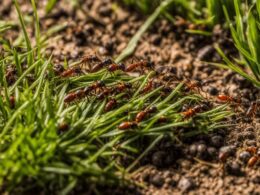If you have a furry friend at home, you know how important it is to keep them safe and healthy. While most dogs love to explore the outdoors, many common garden plants can pose a danger to their health. One such plant is the trumpet vine, which can be found in many gardens across the country. But are trumpet vines poisonous to dogs? The short answer is yes.
While trumpet vines are not usually fatal to dogs, they can cause a range of symptoms that can be very uncomfortable for your pet. In this article, we will discuss how to protect your dog from trumpet vine toxicity, how to recognize the symptoms of poisoning, and what to do if your dog is exposed. But first, let’s take a closer look at the dangers of trumpet vines for dogs.
Post Summary:
- Trumpet vines are poisonous to dogs and can cause a range of uncomfortable symptoms.
- Preventing your dog from eating or coming into contact with trumpet vines is the best way to safeguard their health.
- If your dog shows signs of trumpet vine poisoning, seek veterinary care immediately.
Understanding Trumpet Vine Toxicity in Dogs
If you suspect that your dog has eaten trumpet vines, it’s essential to understand the toxicity of this plant and recognize the symptoms of poisoning.
The trumpet vine contains a toxic substance called “leurosine.” When ingested, it can cause a variety of symptoms such as gastrointestinal irritation, vomiting, diarrhea, and drooling. The sap of the trumpet vine can cause skin irritation and contact dermatitis in dogs.
Recognizing Symptoms of Trumpet Vine Poisoning in Dogs
The symptoms of trumpet vine poisoning in dogs can be quite severe and should be taken seriously. If you notice any of the following symptoms, contact your veterinarian immediately:
- Vomiting
- Diarrhea
- Drooling
- Abdominal pain
- Lethargy
- Difficulty breathing
In severe cases, trumpet vine toxicity can lead to seizures, coma, and death.
Note: If your dog has ingested any part of this plant, seek veterinary care immediately, even if he or she is not showing any symptoms.
Trumpet Vine Allergy in Dogs
Some dogs may experience an allergic reaction to the trumpet vine. If your dog is allergic to the plant, the symptoms may include itchy skin, hives, swelling, redness, and difficulty breathing.
If your dog is showing any signs of an allergic reaction, take him or her to the vet as soon as possible. It’s important to note that allergic reactions can be life-threatening, so don’t delay seeking medical attention.
Now that you know the symptoms of trumpet vine poisoning, it’s time to learn how to prevent your dog from being exposed to this toxic plant.
Preventing Trumpet Vine Poisoning in Dogs
If you have a dog, it’s essential to ensure their safety in your garden. With this in mind, it’s vital to identify plants that are safe for dogs to eat and play around. Here are some tips to safeguard your pet from trumpet vine toxicity:
Know the Signs of Trumpet Vine Allergy in Dogs
Dogs might not show an immediate reaction to trumpet vine ingestion, but symptoms can start to appear within hours or days. If your dog starts showing the following symptoms, it might be due to trumpet vine poisoning:
- Vomiting
- Diarrhea
- Loss of appetite
- Depression
- Lethargy
- Difficulty breathing
- Swelling around the mouth and tongue
If you notice any of these symptoms, contact your veterinarian immediately.
Choose Safe Plants for Dogs
There are many plants that are safe for dogs and can add beauty to your garden. Consider planting some of these dog-friendly options:
| Plant Name | Plant Type |
|---|---|
| Blueberry | Shrub |
| Carrots | Vegetable |
| Parsley | Herb |
| Marigold | Annual |
| Phlox | Perennial |
Avoid Letting Your Dog Eat Plants in Your Garden
While it might be tempting to allow your dog to roam free in your garden, it’s crucial to watch out for their safety. A dog might start eating anything they come across in your garden, including toxic plants like trumpet vines. Make sure you keep a close eye on your dog while in the garden to prevent any such incidents.
Train Your Dog to Avoid Toxic Plants
Training your dog to avoid toxic plants can save them from potential poisoning. Get started with leash training and make sure your dog recognizes commands like “leave it” and “drop it”. Moreover, keep your dog engaged in activities to keep them away from potential hazards.
By following these simple steps, you can ensure the safety of your pet in your garden and avoid the dangers of trumpet vine toxicity in dogs.
What to Do If Your Dog is Exposed to Trumpet Vines
If your dog has ingested trumpet vines, it’s important to act quickly to prevent further harm. The first thing you should do is call your veterinarian or the Pet Poison Helpline to seek professional advice. They will be able to provide step-by-step guidance on how to proceed and determine whether your pet requires immediate medical attention.
In the meantime, try to identify the exact type of plant your dog has eaten, as this will help your vet to determine the best course of treatment. Take a sample of the plant or a clear picture to show the vet if possible.
Never induce vomiting in your dog unless specifically instructed to do so by a veterinarian or poison control expert. This could potentially cause more harm, especially if the plant is toxic.
Keep a close eye on your dog’s behavior and any symptoms that develop. Symptoms of trumpet vine poisoning in dogs may include vomiting, diarrhea, drooling, lethargy, loss of appetite, and even seizures in severe cases. If you notice any of these symptoms, seek medical attention immediately.
What to Do If Your Dog is Exposed to Trumpet Vines: Quick Actions
If you suspect your dog has been exposed to trumpet vines, take the following immediate actions:
- Call your veterinarian or Pet Poison Helpline
- Try to identify the plant your dog has eaten
- Do not induce vomiting without professional guidance
- Monitor your dog’s behavior for symptoms of poisoning
By acting quickly and seeking professional help, you can help to minimize the potential harm to your furry friend. Remember to always supervise your dog while outside, and take precautions to prevent exposure to toxic plants in your garden.
Other Common Garden Hazards for Dogs
While trumpet vines can be a significant risk for your furry friends, there are other common garden hazards that you should know about. By being aware of these dangers, you can take the necessary precautions and safeguard your pet.
Other Plants Toxic to Dogs
There are several other garden plants that can be harmful to dogs if ingested. These include:
- Azaleas and rhododendrons
- Daffodils
- Lilies
- Sago palms
- Tulips
- Tomato plants
It’s important to be cautious when planting and landscaping your garden. Be sure to research any new plants before introducing them to your yard.
Dog-Proofing Your Garden
One of the best ways to protect your dog from garden hazards is to create a dog-friendly environment. You can do this by:
- Using raised garden beds to keep plants out of reach
- Installing barriers or fencing to keep your dog out of areas where dangerous plants grow
- Using non-toxic fertilizers and pesticides
- Keeping walkways and paths clear of sharp objects or debris
Common Garden Hazards for Dogs
In addition to toxic plants, there are several other common garden hazards that can pose a risk to dogs. These include:
- Sharp or pointed garden tools
- Bee and wasp stings
- Hot surfaces, such as concrete or asphalt
- Stagnant water or water features
By being aware of these potential hazards, you can take steps to prevent accidents from occurring and ensure that your dog can safely enjoy your garden.
Safeguarding Your Pet and Creating a Dog-Friendly Environment
Now that you know the dangers of trumpet vines for your furry friend, it’s important to take steps to safeguard your pet and create a dog-friendly environment in your garden. Here are some tips:
Choose Safe Plants
One of the easiest ways to avoid plant-related pet hazards is to choose dog-friendly plants. Some safe options include pet grass, sunflowers, marigolds, and snapdragons. Do your research before adding any new plants to your garden and avoid those that are toxic to your furry friend.
Grow Plants in Raised Beds
You can also keep your dog safe by growing plants in raised beds. This will help to keep your dog from digging up the plants or accidentally ingesting them. Plus, raised beds can add depth and style to your garden.
Add Physical Barriers
If you have particularly curious or mischievous dogs, you may need to add physical barriers to keep them out of areas where dangerous plants may be present. Consider adding a fence or gate to block off areas with potentially harmful plants.
Teach Your Dog Boundaries
Teach your dog boundaries in the garden from an early age. Provide a designated area for playtime and teach your dog to avoid certain areas. Place markers around unsafe plants and teach your furry friend to steer clear.
By following these tips, you can create a safer, more dog-friendly garden environment for your furry friend. Remember, it’s always better to err on the side of caution and keep your pet safe from potential hazards.
FAQ
Q: Are trumpet vines poisonous to dogs?
A: Yes, trumpet vines can be poisonous to dogs if ingested. It’s important to safeguard your pet and prevent them from consuming these plants.
Q: What are the dangers of trumpet vines for dogs?
A: Trumpet vines can cause various symptoms of toxicity in dogs, including digestive upset, vomiting, diarrhea, and in severe cases, more serious effects on the cardiovascular and nervous systems.
Q: What are the symptoms of trumpet vine poisoning in dogs?
A: Symptoms of trumpet vine poisoning in dogs may include drooling, nausea, vomiting, diarrhea, excessive thirst, lethargy, tremors, difficulty breathing, and irregular heart rhythms.
Q: Can dogs get sick from eating trumpet vines?
A: Yes, dogs can get sick from eating trumpet vines. It’s important to ensure your dog’s environment is free of potentially toxic plants and provide them with safe alternatives.
Q: What should I do if my dog eats trumpet vine?
A: If your dog eats trumpet vine, it’s essential to seek immediate veterinary care. Contact your veterinarian for guidance on the next steps to take.
Q: What are some other common garden hazards for dogs?
A: There are several other plants that can be toxic to dogs, including lilies, azaleas, certain mushrooms, and certain parts of tomato plants. It’s important to dog-proof your garden to keep your pet safe.
Q: How can I create a dog-friendly garden environment?
A: To create a dog-friendly garden, choose plants that are safe for dogs, provide plenty of shade and fresh water, secure any hazardous materials or chemicals, and ensure your garden is properly fenced to prevent escapes.









